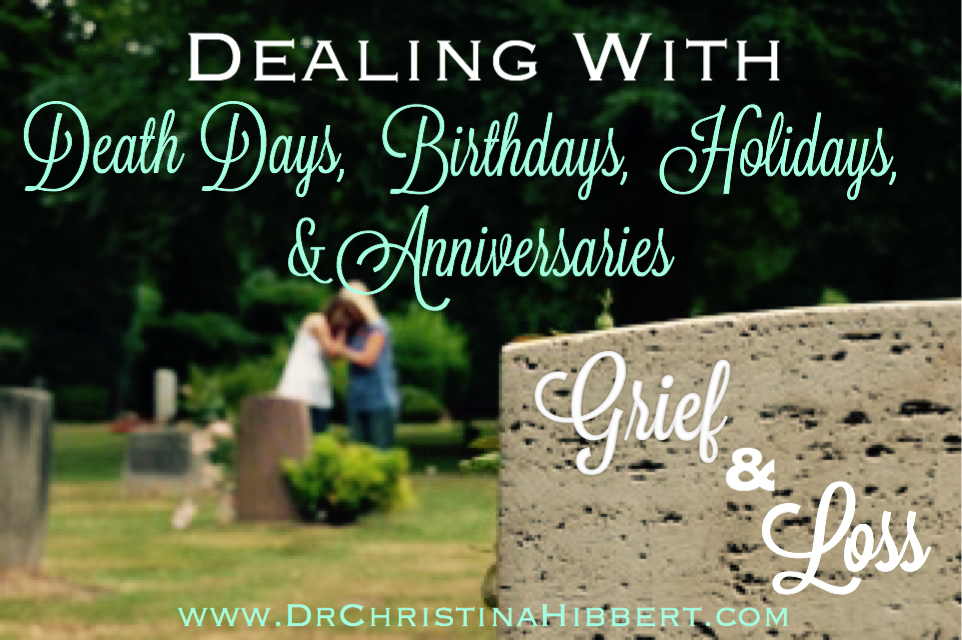
16 Apr Grief &Loss: Dealing with Death Anniversaries, Birthdays, Holidays
Birthdays and death anniversary days have been on my mind. Monday was my sister, Shannon’s, birthday. She would have been thirty-nine. Thirty-nine! It’s hard to imagine. She’s forever frozen in my memory at thirty-one.
My youngest sister, Miki, who died twenty-two years ago, is forever frozen as a little girl, barely eight, even though this summer, she would have been turning thirty. I think of her as I remember Shannon. I can still see her blond curls bouncing as she laughed and played in the grassy yard.
And, in less than two weeks, it will have been one year since my dear friend, Jody, died. Another new death day is almost here; it’s been looming over my family, and hers, for almost one year.
Dealing with Death Anniversaries, Birthdays, & Holidays
Birthdays, death days, holidays, and anniversaries—they can be hard to handle. Most of us don’t know what to expect when they start creeping up. Will it be a day of remembering our loved one fondly? Will it be a day of remembering the pain of their loss? Can any holiday ever feel the same again?
I’ve experienced many birth, death, anniversaries, and holidays over the years, and I understand how tough it can be to know what to do--how to handle it, how to make it through. I’ve learned a few things that have helped me, and I hope they might be helpful to you.
(Watch my 3-Minute Therapy video, "Grief & Loss: Dealing with Death Anniversaries, Birthdays, & Holidays," and subscribe to my YouTube channel, here.)
1) The first year’s birth/death/anniversary/holidays are usually the hardest.
Because we don’t know what to expect, they can seem overwhelming as they approach for the first time. We may want to feel a certain way but find we feel completely different when the day’s finally arrived. We may place heavy expectations for that day and find our expectations aren’t met. We may be feeling like, “Who am I now that my loved one is gone, and how do I handle this anniversary?” Or, we may expect to feel deep grief or sorrow and be surprised to feel “fine,” which can sometimes lead to unwanted (and unnecessary) feelings of guilt.
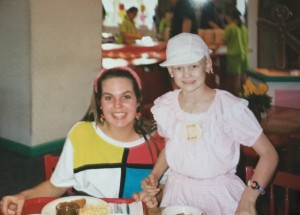
My little sister, McLean (or Miki-7) and me (18) at Disneyworld for her “Make-a-Wish” vacation. Such a fun family trip, only months before she died of cancer.
The first year after Miki died, I felt thoughtful, peaceful, and yes, sad at the thought of missing her growing up years; but it was a nice day spent with friends at college, remembering her incredible, short life. The first year after Shannon died felt more like a finish line I’d been hoping to get through. I felt like I wanted to be alone, like I wanted to remember her fondly, but I still had too much pain and grief and even anger over her death and how it changed my life, to experience that day as I’d hoped. It felt more like a success just to make it through.
Christmas without Shannon and Rob, my brother-in-law, was tough, and that first year, I put tremendous pressure on myself to “make it perfect.” As I write in This is How We Grow, “I realize the pressure to make Christmas perfect is unreasonable and self-inflicted. I don’t even believe in perfection, but it’s been such a hard year that I want the gift I give to be a peaceful Christmas for our family” (loc. 1341, Kindle). Others may feel the opposite—wanting to completely check out, to not even celebrate at all.
Yes, the first year is almost always the hardest.
2) Time helps, but there’s no set time limit for grief.
Many people are told they should grieve for “x” amount of months or weeks, but that’s not how grief works. There is no time limit, and the intensity and duration of grief (and how hard it might or might not be to get through anniversary days) really depends on many other factors—like how the person died and what your relationship was like before they died.
Those whose loved ones died in unexpected, sudden or traumatic ways may experience longer or more complicated grief, including trauma and anger. Suicide can be especially difficult. And those who had an estranged or uncertain relationship with the deceased may also struggle more over time.
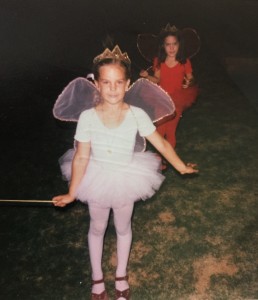
This is how I remember Shannon–right behind me, playing, laughing, being my best friend. Being my sister.
Monday, on Shannon’s birthday, was the first year I felt free to celebrate and remember her with joy. The first few years, I remember feeling angry that some of her friends or other family members were “celebrating” her birthday. I felt like her death had left me with such a burden to sort through that I couldn’t celebrate her. Because of how she died—a stupid, drunken mistake, an overdose, but by her own hand—it made it even harder. I didn’t want to celebrate her. Instead, I tried to ignore her birthday and I geared up to remember her on her death day.
This year, almost eight years later, I felt the opposite. On her death day in October, I spoke at a This is How We Grow book club, sharing our story. It honored her and was fun for me. No remorse. No pain. Just a simple, normal day. But on her birthday, on Monday, I finally felt ready to celebrate—to celebrate the gift of having had her as my sister and to celebrate the blessing of now raising her children, our children. I gave myself and my family gifts in honor of Shannon. I went and had a massage, because that’s what I would have done with her and because she was a massage therapist, and that’s how she took care of me. I thought of her and missed her and loved her. I had a lovely, quiet lunch, almost like taking her to lunch, remembering her goodness and her loving heart. And I took my family—our family—out to play on the golf course as the sun set and to get ice cream in honor of her birthday, so we could remember our sister, mother, and aunt.
3) It’s okay to let it be “just a day.”
I recall hearing someone on a TV show talking about the second anniversary of the death of her husband and how she had realized “it was really just another day, and that’s okay.” It took the pressure off for her. This person chose to remember her loved one on his birthday, when she could feel joyful and nostalgic, rather than to remember his painful death. Of course, this was after she had spent significant time working through her grief, which is very important to do. Yet, as we work through our grief, it can be healing to let go of the power of “that day” and realize it’s really just another day. This has helped me tremendously over the years to do the same for my sisters’ death days, as the time was right.
4) It’s also okay to remember; in fact, remembering is good.
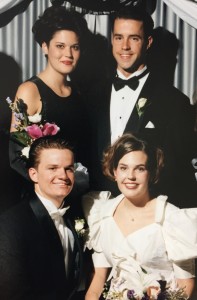
OJ & me on our wedding day, with Shannon & Rob, just before their wedding. Shannon was so beautiful that night; I’ll never forget it. We loved having them there with us as our lives began.
Remember the good times. Remember their strengths. Remember what you loved most about them. Often, on the birth or death day of my sister or brother-in-law, we have a family dinner and remember them. My two sons who were my nephews share stories of their “first parents,” and my other four sons and daughters share memories of their crazy aunt and uncle. My husband and I share funny times from college and our early-married years with them. It’s good to remember. It’s also good for kids to know they can remember and to feel safe doing so.
It’s also good to remember others’ loved ones. The year I published my memoir, This is How We Grow, a friend who had been helping me with edits showed up at my door on “Shannon day,” as I call her death day, with homemade oatmeal chocolate chip cookies. “I read in your book how she used to bake these for you and I just wanted to let you know, I remember.” It still brings tears to my eyes.
Send a note, an email or text, stop by and give a hug, or drop off some flowers just to show you haven’t forgotten. When my little sister Miki died, one of her best friends showed up every year on her birthday with flowers for my mom. From the time she was 8 until she left for college, this friend remembered. And we have never forgotten it.
5) Let yourself feel about and experience birthdays, death days, holidays, or anniversaries however you feel is best.
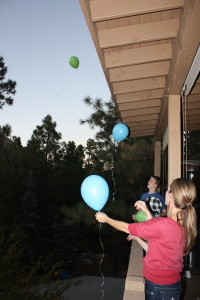
The kids and I, sending balloons to Shannon, on the 5th anniversary of her death.
There is no “right” or “wrong” when it comes to these days. Sometimes, it’s healthier to cry and mourn. Sometimes, it’s healthier to laugh and celebrate. Sometimes, it’s healthier to just let it be another day, and sometimes, it’s healthier to look ahead and plan the day.
I’ve spent such days going for a hike, writing in my journal, sleeping in and napping later, speaking about my loved one at a book club or other event, playing with my kids and remembering as we send balloons up to heaven, reading in a hammock, calling and talking with my family or friends about them, sharing my feelings with my husband, or sobbing in a bath. Each of these has felt right for that day and for that time of my progression through grief.
6) Honor their memory, & honor yourself for carrying on.
As the years progress, it becomes less about what “I have lost” and more about who they were, what they taught me, and what I can leave behind in honor of them. I can carry on. I can learn from their lives. I can grow. Then, I can share that growth with others.
I’ve attempted to do so in This is How We Grow. It honors my sister and brother-in-law, and father-in-law, and all whom I lost during that time of my life. I wouldn’t be doing what I do now—writing and teaching—without my sister, and brother-in-law, and all whom I’ve lost. I am grateful beyond words for this gift they’ve given me. I try to honor them by never taking it for granted.
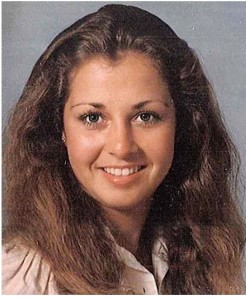
My dear friend, Jody. “Second mom” to my kids, as I’ve been “second mom” to hers. I’ll never forget her.
In less than two weeks, my family will spend an afternoon with my friend, Jody’s, husband and three children, eat a home-cooked meal, share memories, and send balloons to remember her. It will feel comforting to be with them, remembering together. Then, on the actual death day, they will spend it together alone, and I will be speaking to a women’s group about women’s mental health and how to take care of themselves, in honor of my friend who struggled to do the same. It’s another way to remember—to use her memory to fuel my passion to help others. To learn from her lessons and then teach, so others might be prevented from the same fate.
That’s one of the best ways we can honor our loved ones who have passed on—to learn from them and then to share what we have learned; to let their legacy be one of hope, of peace, of compassion, and great love.
What are your thoughts and feelings about death, birth, anniversary, and holidays? How do you cope with them? What have you learned? Share with us by leaving a comment, below.
Be sure to check out Dr. Hibbert’s IPPY Award-winning, #1 Amazon Bestseller, This is How We Grow!
Available now at Amazon or Barnes & Noble!
Available now at Target, Amazon, Barnes & Noble, New Harbinger, or your local bookseller!
“Who Am I Without You is the light at the end of the tunnel!”
“So much more than a breakup book, this is a guide to self-worth for anyone–all in a neat little 52-lesson package!”
Don’t miss a thing!
SUBSCRIBE, above, “like” my Facebook pages (Dr. Christina Hibbert; This Is How We Grow), and follow me on Twitter,Pinterest, & Instagram!
Related Posts/Articles:
In Memory of my Sister, on the 5th Anniversary of her Death
Breaking the Silence about Suicide, Grief, & Family Survivors
Siblings & Grief: 10 Things Everyone Should Know
Children & Grief: What You Should Know
Understanding & Coping with Loss & Trauma
The Do’s & Don’ts of Helping Others Through Grief
What I’ve Learned about Personal Growth from a Decade of Yearly Themes
Weather the Storms Together: 4 Ways to Strengthen Families in Times of Stress
PPD & Motherhood Mental Health: Self-Care & Letting Help In–The 2 Most Important Things
“This is How We Grow:” Understanding the Seasons of Personal Growth
Join my Free, Online “This Is How We Grow” Personal Growth Group!
Discovering Self-Worth: Why is it So Hard to Love Ourselves?
How to Feel Self-Worth: “The Pyramid of Self-Worth” (& video)
Learning Self-Love: 5 Tricks for Treating Yourself More Kindly
16 Things I’d Like My Postpartum Self to Know, 16 Years & 6 Kids Later (PSI Blog Hop)
The Pyramid of Self-Worth: How to FEEL Self-EsteemDealing with Grief & LossSelf-Esteem & Self-Worth: 10 Things Everyone Should Know
Motherhood Mental Health: Self-Care & Letting Help In–the 2 Most Important Things
Motherhood & Mental Health: The Importance of Alone Time
“My Kids are Driving Me Crazy!” (again)–Why parenting is so darn tough!
Relationship Rescue: “The Reconsideration Exercise”

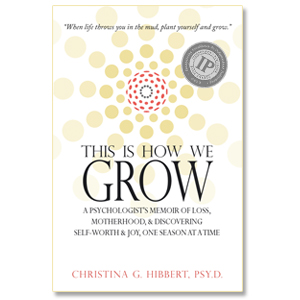
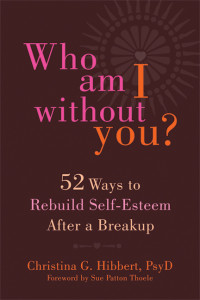
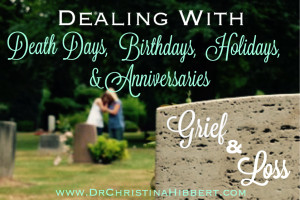
My grandfather passed away a few years back, and I often think about him. While the death of a loved one is always difficult, I find comfort in the fond memories I have of him. Finding ways to honor loved ones who have passed away helps the healing process.
Thank you for this post. I lost my dad very unexpectedly in early July. My parents’ 35th wedding anniversary and his 57th birthday would have both been last week. They were tough for me, and I feel like they were so soon after his death that next year will feel like the first year, too. Anyway, I’m really glad I found your blog and I’m sure I’ll be reading more of your posts and articles.
My sister had twins and one of them died in an accident aged two, it’s now been 11 years and at every family event the lost child’s name is raised, not in a manner that seems to be respectful remembering but in a way that seeks sympathy. She makes a big thing about buying Christmas & Easter presents for him that the other children have to unwrap in his memory. On the anniversary of his death she posts sympathy fishing type posts on Facebook. On the twins birthday the lost twin is “remembered” at each phase of the day including letting go balloons, during cake cutting etc. She has more photos of the dead child around the house than of the living children. The other twin is a withdrawn child and from an external view appears to live in the shadow of their dead twin. Is this method of grieving still considered healthy and if not should she be seeking help?
It’s been 2 years. My family has moved on but I can’t seem too. 55 years of marriage, wish I had more.
YouTube video is not showing… wanted to see it 😢
Thank you for letting me know. I just updated the page, and it should be working now. I hope it is helpful.
I think it is an incredibly stupid and illogical process to celebrate or acknowledge the birthdays of dead people. They aren’t getting any older, they never will. It’s a sickness forced upon sane logical people by delusional grieving people. Even Google forces us to acknowledge the birth of folks that have been dead for 100s of years!!! It’s absolutely ridiculous! These same people don’t celebrate death dates, though, do they? Although it would make far more sense to acknowledge that so-and-so has be dead for x-amount of years because that is accurate. They wouldn’t be x-years old today!! Because they didn’t live! Grieve how you need to, but stop forcing the rest of us to play along! It’s a sick, morbid, fantasy. (Coming from a guy who has nothing but dead family members.)
I hear you, and I know many feel as you do. You’re entitled to feel how you feel, and I’m glad you honor it. For many, however, it’s not even feeling the need to “celebrate” a birthday, but rather that a lot comes up emotionally around anniversaries and birthdays, and most don’t know what to do with all that emotion. It’s normal to feel a lot at these times, and it’s ok for those who are flooded to feel so. Just as it’s ok for those who feel like you to not.
How do I respond to my sister when she insists that I remember her daughter’s death date every year,and if I don’t she tells me I don’t care about her. My son’s birthday and husbands is the same week my niece died. The wants me to grieve her and be sad in this week and I can’t. I do love her. And I loved my niece also but I don’t feel her loss at only this time of year. I have explained this to her but she is adamant. What do I do?
This is so challenging. Everyone just grieves differently and it can be tough when family members expect you to deal with grief the same way they do. All you can do is continue to honor your sister’s grief for her daughter by saying you understand why she feels how she feels, AND continue to express your own grief response, how you’re coping, and how you are remembering her all year long because you love her. It sounds like your sister could use some help with her grief too. Grief can become “complicated” and this sounds like it could fall into that category, meaning there’s more going on in her than she likely realizes. I hope she can find the support and help she needs too. all of you. It’s so hard. Sending prayers and love.
Just getting started with this, my wife passed away 11/23/23, thanksgiving day, now Christmas is around the corner, don’t know how I’ll ever handle it, I retired in 2010 and her and I have been inseparable we done everything to gather, I am 72 years old, to old to start over, just don’t know what to do, I miss her so so much.
I am so terribly sorry for your loss, William. I imagine it’s been a very difficult few months, and you’re really just at the start of this grief journey. Of course you miss her. Grief is the love we feel for those we lose. Just know you’re not alone, and I think you’re doin the best you can.
Sending warm wishes and prayers.
My 18y/o son was killed by blunt force trauma to his head which caused linear fractures and brain stem hemorrhage. When people tell me to “move on … your son doesn’t want you to be sad… you have to keep on living” it adds insult to injury. In my grief I’ve found very few people who can truly respect and honor my grief… the dismissed murder of my young and healthy son whom donated all of his organs. Yes, I’m happy my son saved so many lives! But that doesn’t take away my daily pain of losing my son to a tragedy and injustice.
I am so sorry to hear of the loss of your dear son. And I hate that so many tell you to “move on,” and that he wouldn’t want you to be sad…. Unfortunately, these are all too common when one is just trying to go on living without the one you lost. It absolutely does not take away your pain or sorrow. It’s a loss you learn to live with, but it’s never really “healed,” I feel. Thank you for sharing your perspective.